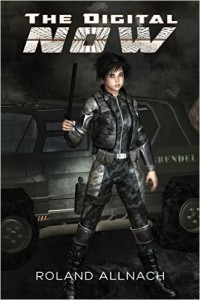Title: The Digital Now
Author: Roland Allnach
Publisher: Tabalt Press
ISBN-13:
Pages: 368
Genre: Science Fiction
www.rolandallnach.com
Buy on Amazon
Pacific Book Review
Very interesting and complex: This is a dark vision of the future with many of the themes characteristic of classic dystopian literature but with a modern digital spin. The Matrix meets Wag the Dog with some elements of classics such as 1984. The devolution of individual freedom is a huge factor in this story and any efforts to recover it will require a modern notion of how we, and the characters in the novel are connected and wired in. This is the rub. Being connected, we are all subject to manipulation, influence, and being “scripted” or programmed. But in a digital age where and when this “wired in” is so ubiquitous in every part of life, the only way to rediscover individuality is within the system.
In the world of this dystopia, we have Carly, a Partolman whose job it is to violently enforce the oppressive laws of the land. Ignorance is bliss in her “reality.” She spends her days beating unruly “cones” into submission and her nights are spent in underground sex dens with all of the dark hedonism of a post-apocalyptic Sodom & Gomorrah. Had she continued on with this life, she would have been ignorantly satisfied. She is scripted to wake up each day with a craving to continue this way. In essence, she is no more human than a computer program.
However, a knock on the head (also scripted by a manipulation within the system) makes her and her partner Graham Chapel begin to question things. Her awakening is gradual and necessarily so because there are a number of different players who intend to use her for their own personal gains or the benefit of the social system of control called “Central.” As she becomes intuitively attuned to how select people are digitally telepathic, and able to influence and manipulate her and others, she also becomes able to resist being scripted. This is the first step in “self-predilection” or to put it more simply, individual freedom.
The ways in which some of these rogues, watchers, and predilectors digitally manipulate society and others is a convoluted matrix akin to a room full of writers arguing over a script. It is like they are Greek Gods toying with humanity. Since Carly is somewhat of a “chosen one,” there are elements of spirituality along with the Greek God idea; as well as the material aspects of socially digital programming.
The masses live under a false consciousness “a nod to Marx maybe” as their thoughts and actions are scripted by these warring social programmers. Wars are written into reality to distract these masses. People are puppets or simulacra. Carly’s journey into discovering the complicated fractalized way this programming operates is difficult until she has a final realization: that in order to change the system, one must do so within that system. In this novel, the Process is reality and the Dream is a kind of cultural consciousness a nod to Jung maybe. With everyone being wired together, the idea of cultural consciousness feels more mechanical or electrical, but the author puts a kind of Buddhist or global spin on it. So, this dystopia is post-apocalyptic and postmodern, but there are spiritual elements as well and the story dances around the idea of what a soul is or can be.
I found The Digital Now to be completely enthralling, terrifying and unique. Fans of science fiction on are going to love reading The Digital Now by Roland Allnach.


